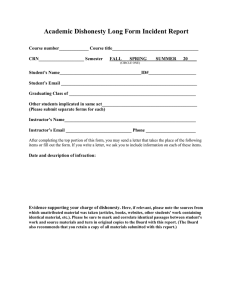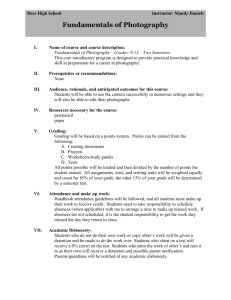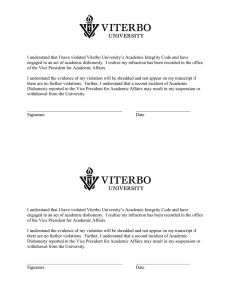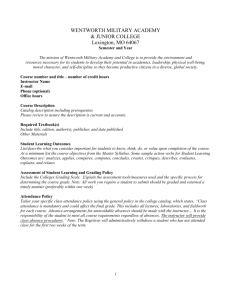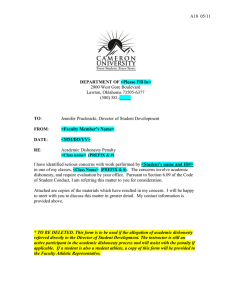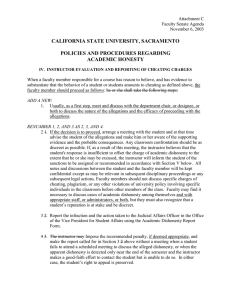Course Syllabus Course Name: General Chemistry I Laboratory
advertisement
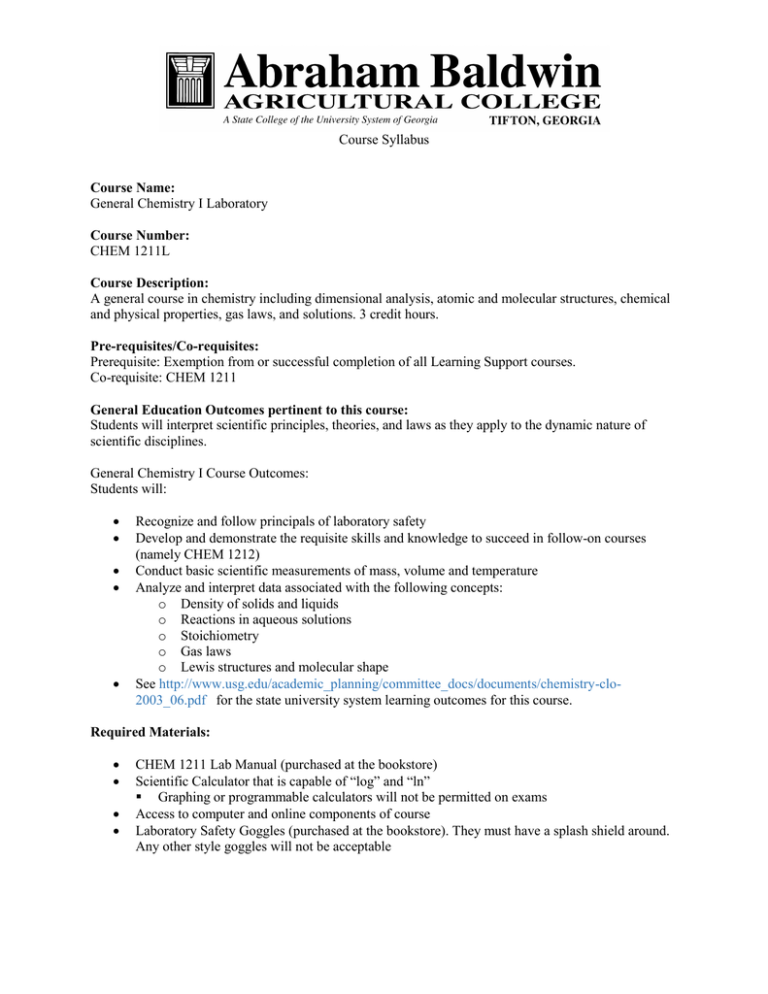
Course Syllabus Course Name: General Chemistry I Laboratory Course Number: CHEM 1211L Course Description: A general course in chemistry including dimensional analysis, atomic and molecular structures, chemical and physical properties, gas laws, and solutions. 3 credit hours. Pre-requisites/Co-requisites: Prerequisite: Exemption from or successful completion of all Learning Support courses. Co-requisite: CHEM 1211 General Education Outcomes pertinent to this course: Students will interpret scientific principles, theories, and laws as they apply to the dynamic nature of scientific disciplines. General Chemistry I Course Outcomes: Students will: Recognize and follow principals of laboratory safety Develop and demonstrate the requisite skills and knowledge to succeed in follow-on courses (namely CHEM 1212) Conduct basic scientific measurements of mass, volume and temperature Analyze and interpret data associated with the following concepts: o Density of solids and liquids o Reactions in aqueous solutions o Stoichiometry o Gas laws o Lewis structures and molecular shape See http://www.usg.edu/academic_planning/committee_docs/documents/chemistry-clo2003_06.pdf for the state university system learning outcomes for this course. Required Materials: CHEM 1211 Lab Manual (purchased at the bookstore) Scientific Calculator that is capable of “log” and “ln” Graphing or programmable calculators will not be permitted on exams Access to computer and online components of course Laboratory Safety Goggles (purchased at the bookstore). They must have a splash shield around. Any other style goggles will not be acceptable The College Policy on Class Attendance: ATTENDANCE Courses at Abraham Baldwin Agricultural College are provided for the intellectual growth and development of students. The interaction with instructors and other students is an important element of the learning process, and a high correlation exists between class attendance and course grades. Therefore to attain maximum success, students should attend all their classes, be on time, and attend all scheduled course activities. Absence from class, for whatever reason, does not excuse a student from full responsibility for class work or assignments missed. Students must accept this responsibility. Individual instructors will establish attendance policies for each class, will publish the policy in the course syllabus, and keep attendance records. The penalty for absences is at the discretion of the instructor and may include failure of the course. Whenever a student is absent, the student must assume responsibility for making arrangements for any assignments missed due to the absence. A student who stops attending class without officially withdrawing will still receive a grade for the course. A student penalized for excessive absences may appeal through the grade appeal process, as stated in ABAC’s college catalog and student handbook. INSTITUTIONAL ABSENCE A student who serves as an official representative of the college is defined as one who: - is authorized to use the college name in public relationships outside the institution; - regularly interacts with non-college individuals and groups over an extended period of time (at least one semester); - represents the college as a part of a group and not as an individual; - represents the college under the direct supervision of a college faculty or staff member; - is authorized, in advance, by the President of the college. Such a student is in no way released from the obligations and responsibilities of all students, but will not be penalized with unexcused absences when absences result from regularly scheduled activities in which he/she represents the college. Further, it is the responsibility of each student to contact instructors prior to the absence and to make arrangements to make up any work that will be missed, in a manner acceptable to the instructor. Advisors of activities will schedule off-campus activities in a manner that does not unduly disrupt the learning process for a student. WITHDRAWAL A student may withdraw from the course up to the midpoint of the semester and receive a grade of W. After midterm, students may withdraw only with the permission of the Academic Dean and may receive a W or WF according to their documented averages at the time of withdrawal. Students abandoning classes will still receive a grade at the end of the semester (probably an F due to missed point opportunities). See the college catalog for the college policy on withdrawal http://www.abac.edu/wp-content/uploads/2012/11/catalog_2013_141.pdf College Policy on Academic Dishonesty: STUDENT CODE OF CONDUCT AND DISCIPLINARY PROCEDURES ACADEMIC CONDUCT CODE A. Academic Dishonesty Academic irregularities include, but are not limited to, giving or receiving of unauthorized assistance in the preparation of any academic assignment; taking or attempting to take, stealing, or otherwise obtaining in an unauthorized manner any material pertaining to the education process; selling, giving, lending, or otherwise furnishing to any person any question and/or answers to any examination known to be scheduled at any subsequent date; fabricating, forging, or falsifying lab or clinical results; plagiarism in any form related to themes, essays, term papers, tests, and other assignments; breaching any confidentiality regarding patient information. B. Disciplinary Procedures 1. When a faculty member suspects that a student has engaged in academic dishonesty, the faculty member will contact the Office of the Vice President for Academic Affairs. The Vice President for Academic Affairs will notify the student in writing of the report and will appoint a neutral person from among the faculty or staff to meet with the faculty member who reported the matter and the student(s) believed to have engaged in academic dishonesty. The purpose of the meeting, to be scheduled by the Office of the Vice President for Academic Affairs, will be to provide a facilitated discussion about what may have occurred. The faculty member who reported the matter, the student(s) believed to have engaged in academic dishonesty, and the facilitator are the only participants in the meeting. Neither audio nor video recordings of these proceedings will be permitted. Following the discussion, the facilitator will submit a form summarizing results of the proceedings to the Office of the Vice President for Academic Affairs. 2. The faculty member and student(s) may reach an agreement about the matter and, if dishonesty is involved, may determine the appropriate consequences. If no resolution is agreed upon, the matter will be forwarded to the Dean of Student Life and Housing, who will convene the Student Judiciary Committee to determine the outcome of the allegation. 3. Guidelines for disciplinary procedures as outlined in Section V of the Student Code of Conduct will be applicable in cases involving alleged academic dishonesty. A written copy of the recommendations by the Student Judiciary Committee shall be sent not only to the student but also to the faculty member who made the allegations of academic dishonesty against the student, to the Vice President for Academic Affairs, and to the President. 4. Prior to any finding of responsibility on the part of the student, the faculty member shall permit the student to complete all required academic work and shall evaluate and grade all work except the assignment(s) involved in the accusation of dishonesty. The faculty member may, however, take any action reasonably necessary to collect and preserve evidence of the alleged violation and to maintain or restore the integrity of exam or laboratory conditions. 5. A student may not withdraw from a course to avoid penalty of plagiarism or other forms of academic dishonesty. For definitions and the Academic Code of Conduct, please see details the Student Handbook. http://www.abac.edu/wp-content/uploads/2012/11/catalog_2013_141.pdf DISABILITY If there is a student in this class who has specific needs because of learning disabilities or any other disability, please feel free to contact the instructor. If you are a student with a disability (e.g. physical, learning, psychiatric, vision, hearing, etc.) and think that you might need special assistance or a special accommodation in this class or any other class, call the Student Development Office at 391-5135 or visit them in the Carlton Center. If you have accommodations please inform the instructor within the first week of classes. *More detailed information relating to the class and instructor will be made available to each student as an addendum to this syllabus.
